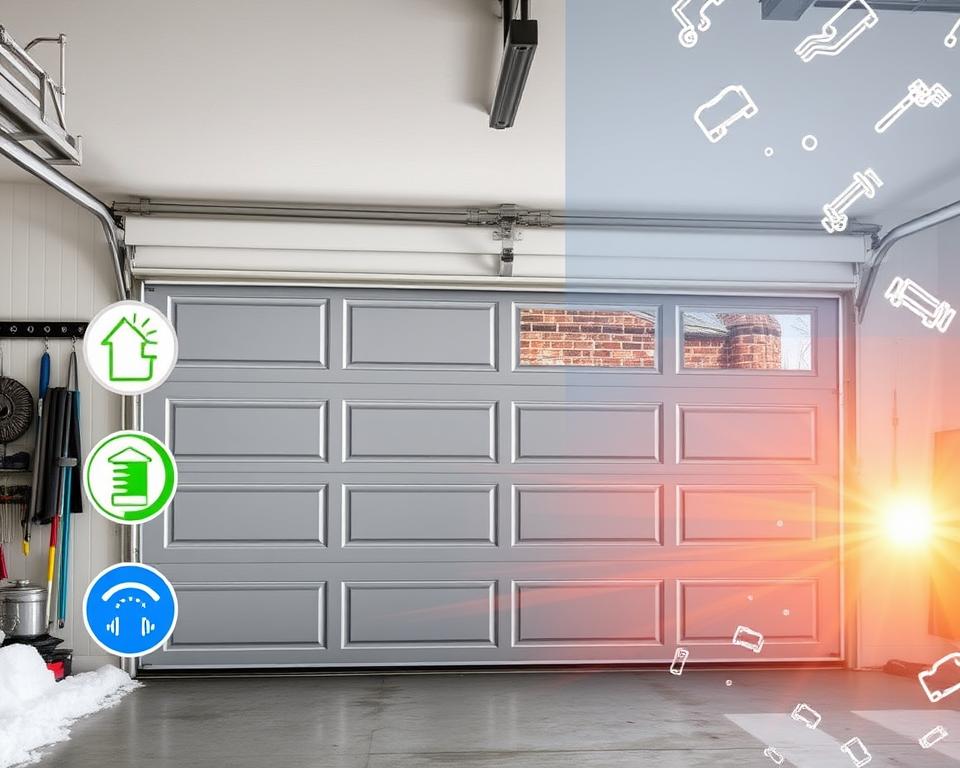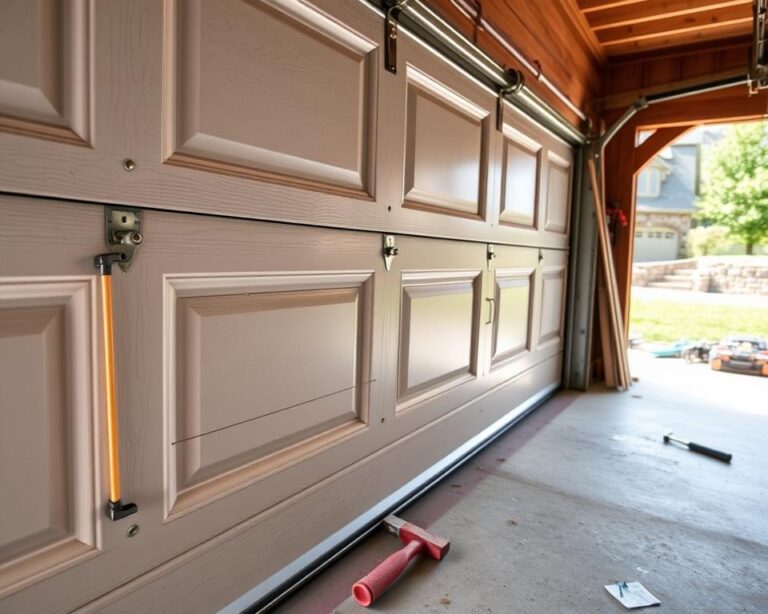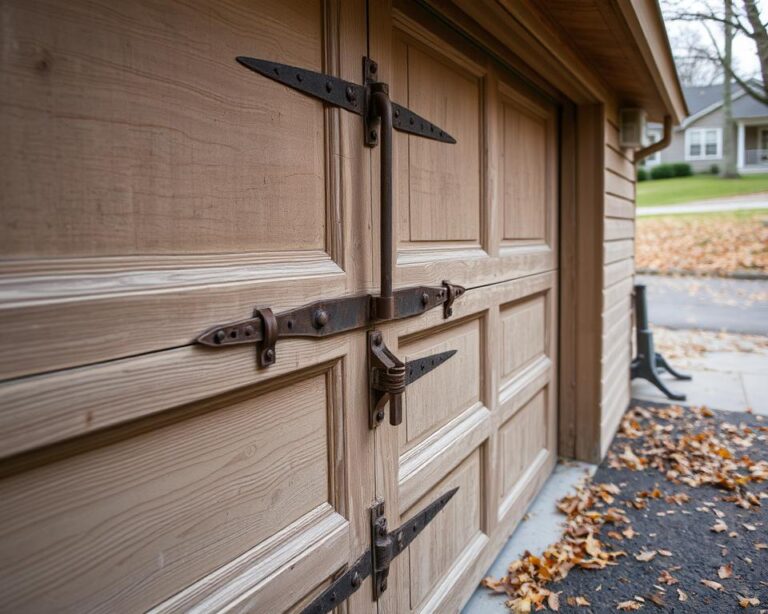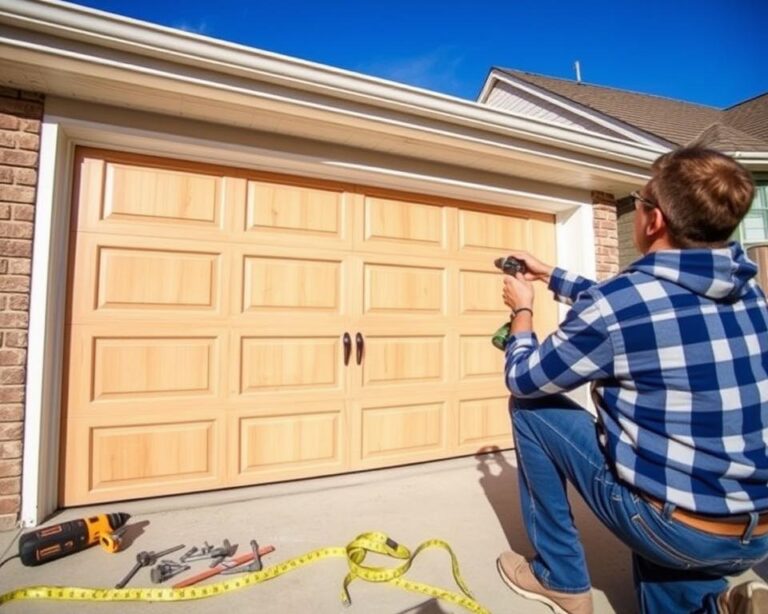Is an Insulated Garage Door Worth the Extra Cost?
Many of us question if an insulated garage door is worth the extra money. We look at the benefits of insulated doors and compare them to non-insulated ones. We’ll see how insulated doors can lower our energy bills, reduce noise, and keep the garage temperature steady. This will help us decide if they’re worth it.
Thinking about insulated garage doors means considering their long-term benefits. They help keep the temperature stable and improve energy use. This is key in deciding if the investment is worth it, when comparing insulated to non-insulated doors.
Exploring insulated garage doors reveals their value for our homes. They help lower energy bills, cut down on noise, and keep the garage temperature stable. These benefits are important in deciding if an insulated garage door is worth the extra cost.
Understanding Insulated Garage Doors: What Sets Them Apart
Energy efficiency is key when choosing garage doors. Insulated garage doors help save money by keeping heat in and out. We’ll explore what makes them special, including their build, materials, and insulation types.
Insulated garage doors are great at keeping energy costs down. They use materials like polystyrene and polyurethane for better insulation. The R-value of a door shows how well it blocks heat flow.
Construction and Materials Used
Insulated garage doors are built in layers. They have a steel or aluminum skin, insulation, and a finish. This design boosts energy efficiency and cuts down on noise.
R-Value Ratings Explained
R-value ratings show how well a door insulates. A higher R-value means better insulation. It’s key for insulated garage door installation.
Different Types of Insulation Available
Garage doors come with various insulation options, like polystyrene and polyurethane. Each has its own benefits and drawbacks. The right choice depends on your climate, budget, and preferences.
The Real Benefits of Installing an Insulated Garage Door
Insulated garage doors offer many advantages. One key benefit is energy efficiency. They help keep the garage warm in winter and cool in summer. This is great for attached garages, as it keeps the living spaces comfortable.
Choosing the right insulated garage door involves several factors. The type of insulation, the door’s construction, and the local climate are important. For example, a door with a high R-value insulates better than one with a low R-value. The door’s build and insulation type also affect its energy efficiency.
Here are some benefits of insulated garage doors:
- Reduced energy loss
- Improved temperature control
- Increased comfort
- Potential for cost savings
For those who use their garage for work or hobbies, insulated doors are a big plus. They help keep the temperature steady, making the space more comfortable.

The cost of an energy-efficient double garage door is between $1,500 and $2,000. But, you can also find DIY insulation kits for about $100. While it’s a big upfront cost, the long-term savings and benefits make it a smart choice for many homeowners.
Is an Insulated Garage Door Worth It? Breaking Down the Costs
Deciding on an insulated garage door depends on several factors, including cost savings. Let’s look at the costs and benefits of insulated garage doors.
Thinking about the initial cost, it’s key to compare it to long-term savings. Insulated garage doors save on energy, lowering your bills. This is great for homes with attached garages, where the benefits are felt all year.
Initial Investment vs. Long-term Savings
An insulated garage door costs about $1,500, says Angi. This might seem expensive at first. But, think about the long-term savings. With an insulated door, you’ll save on energy bills and reduce strain on your HVAC.
Energy Bill Impact Analysis
Insulated garage doors are very energy-efficient. They cut down on heat loss in winter and keep your garage cool in summer. This means lower energy bills. Top brands like Clopay and Amarr offer energy-saving options.
When picking an insulated garage door, think about the cost savings and benefits. A quality insulated door means long-term savings and a more comfortable home.
How Insulated Garage Doors Impact Your Home Environment
Many of us don’t think about how our garage doors affect our home’s energy use and comfort. But, insulated garage doors can really make a difference. They help keep the heat in or out, which can lower your energy bills and make your home more comfortable.
When picking insulated garage doors, think about the insulation type, door build, and your local climate. It’s key to choose doors that are energy-efficient, which is very important for homes with garages attached. These doors can cut down on heat loss or gain, saving you money and energy in the long run.
Temperature Control Benefits
Insulated garage doors help control your home’s temperature. They keep it warmer in winter and cooler in summer. This is great for homes with living areas above or next to the garage. They help keep the temperature steady, making your home more cozy and energy-smart.

Noise Reduction Properties
Insulated garage doors also reduce noise. They act as a sound barrier between your garage and living areas. This makes your home quieter, which is a big plus for those living in noisy cities.
Some key benefits of insulated garage doors include:
- Reduced energy bills
- Improved temperature control
- Noise reduction
- Increased comfort and sustainability
Common Installation Considerations and Requirements
When you’re looking at insulated garage door installation, there are a few things to think about. The insulation type, door build, and the weather are all key. For example, homes with attached garages might need more insulation than those without.
The garage’s location also matters. If it’s an extension of the house or under a bedroom, it affects the advantages of insulated garage doors.
When picking insulated garage doors, look at the R-value and STC rating. The R-value shows how well the insulation keeps heat out. The STC rating tells you how well the door blocks sound. Doors with higher R-value and STC ratings are better at keeping things out.
It’s also important to seal the garage door well. This stops air from leaking and keeps the door efficient.
The insulation type in the garage door matters too. Polyurethane foam is usually better than polystyrene. Plus, a well-insulated garage door can save you a lot on heating and cooling costs. Some studies say you could save 10-20%.
In short, insulated garage door installation needs careful thought. You should think about the insulation, door build, and weather. By picking the right door and installing it right, you get many benefits. These include saving energy, reducing noise, and saving money.
Making the Smart Investment Choice for Your Home
Choosing an insulated garage door for your home is a big decision. It might cost more upfront, but the long-term benefits are huge. These include better energy use, keeping your home at a steady temperature, and boosting your home’s value.
The U.S. Department of Energy says an insulated garage door can cut energy use by up to 71%. This means big savings on your utility bills over time.
When you’re thinking about an insulated garage door, think about what you need. The weather in your area, the type of insulation, and the door’s quality all matter. Insulated doors also last longer, block out noise, and look better. They can make your home look nicer and increase its value when you sell it.
In the end, whether to choose an insulated or non-insulated garage door is up to you. But, the facts show insulated doors are often a better deal. They make your home more energy-efficient, comfortable, and durable. This is a smart choice for your home.







